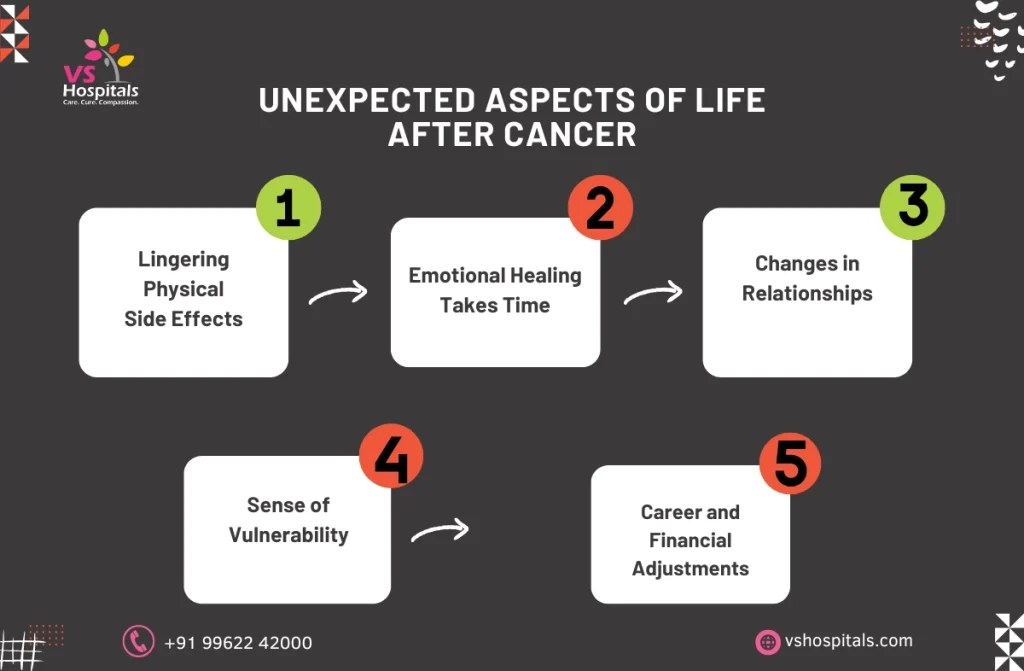Survivorship after cancer is a unique journey marked by resilience, hope, and continuous healing. Every survivor’s path is personal, filled with milestones and challenges beyond treatment. At VS Hospitals, we recognize the importance of life after cancer, supporting survivors as they adapt and embrace each day. This guide provides insights into what survivorship truly means, the strength needed to thrive, and resources to help individuals build a fulfilling life after a cancer diagnosis.

What is Cancer Survivorship?
Survivorship after cancer refers to the phase of life following a cancer diagnosis and treatment. It’s more than just being cancer-free; it’s a journey that begins at diagnosis and continues throughout one’s life. Survivorship focuses on physical, emotional, and mental well-being, allowing survivors to navigate life with purpose and resilience. Key aspects include:
- Physical recovery, including regaining strength and managing treatment side effects.
- Emotional healing to address changes in identity and self-image.
- Ongoing support for health and lifestyle adjustments.
Survivorship after cancer empowers individuals to reclaim their lives, focusing on wellness, regular follow-ups, and finding joy in everyday moments.
Who is a Cancer Survivor?
A cancer survivor is any individual who has been diagnosed with cancer, regardless of the stage of treatment or recovery. Survivorship starts from the moment of diagnosis and extends through the entire journey, encompassing physical, emotional, and social well-being. The term “cancer survivor” includes those in active treatment, remission, or those who have become cancer-free vs cancer survivor. Survivorship after cancer may experience:
- Emotional Shifts: Adapting to life post-treatment can affect mental health.
- Lifestyle Adjustments: Often necessary to promote long-term health.
- Social Changes: Relationships may evolve or deepen after a cancer experience.
Every survivor’s journey is unique, and VS Hospitals is committed to providing guidance, support, and resources tailored to each individual’s needs.
Types of Cancer Survivors
The journey of survivorship after cancer varies depending on the type and stage of cancer. Some cancers, with early detection and effective treatment, see a higher rate of survivors. Common cancers where survivorship is prominent include:
- Breast Cancer: Early detection and advancements in treatment contribute to high survivorship.
- Prostate Cancer: Often detected early, leading to effective long-term outcomes.
- Colorectal Cancer: Improved screening helps in early diagnosis and successful treatment.
- Lymphoma: Targeted treatments have improved the life expectancy of survivors.
Each survivor faces unique post-cancer challenges, but with support and resources, they can lead fulfilling lives.
5 Things They Never Tell You About Life After Cancer
Survivorship after cancer brings unexpected challenges and realizations. Here are 5 things they never tell you about life after cancer often encounter but aren’t usually prepared for:
- The “New Normal”: Many aspects of daily life change, from energy levels to priorities, requiring new routines and habits.
- Emotional Healing: While the physical journey is tough, emotional recovery may be even longer, bringing moments of anxiety and reflection.
- Shifted Relationships: Friendships and family dynamics may shift, as loved ones may not fully understand the survivor’s experience.
- Physical Reminders: Side effects from treatment and surgery often linger, creating lasting physical reminders.
- Redefining “Cancer Survivor”: Adapting to life as a survivor means balancing the past and moving forward.
Cancer-Free vs Cancer Survivor
The distinction between being cancer-free and identifying as a cancer survivor is essential. Being cancer-free means that no detectable cancer remains in the body, but survivorship embraces more than this—it encompasses the entire journey from diagnosis onward. A cancer survivor includes anyone who has experienced cancer, whether currently in remission, undergoing treatment, or completely healed.
- Cancer-Free: No signs of cancer, achieved post-treatment.
- Cancer Survivor: Ongoing journey that includes mental, emotional, and physical recovery.
- Empowerment in Survivorship: Reflects resilience and life beyond treatment.
Cancer survivors are not solely defined by their diagnosis but by their strength and continued journey forward.
Cancer Survivorship Programs
Cancer Survivorship Programs are designed to support individuals after completing cancer treatment, helping them transition to a healthier and fulfilling life. At VS Hospitals, our survivorship programs focus on physical recovery, emotional well-being, and overall lifestyle adjustments to address the unique needs of each cancer survivor.
Key aspects of our programs include:
- Physical Rehabilitation: Customized exercises to regain strength and improve mobility.
- Emotional Support: Access to counseling and group sessions to process the emotional impact.
- Lifestyle and Nutrition Guidance: Expert advice on healthy eating and fitness routines.
- Regular Follow-Up Care: Comprehensive check-ups to monitor and maintain long-term health.
Our Cancer Survivorship Programs empower survivors to move forward confidently.
Conclusion
Survivorship after cancer is more than just overcoming illness; it’s about embracing a renewed life filled with purpose, health, and happiness. At VS Hospitals, we are committed to supporting each survivor’s journey, offering specialized care and guidance to help navigate the unique challenges and joys of life beyond cancer. With the right resources and a compassionate approach, survivors can reclaim their lives and move forward with confidence, strength, and the promise of a bright future.
Read also Menstrual Cycle Problems
